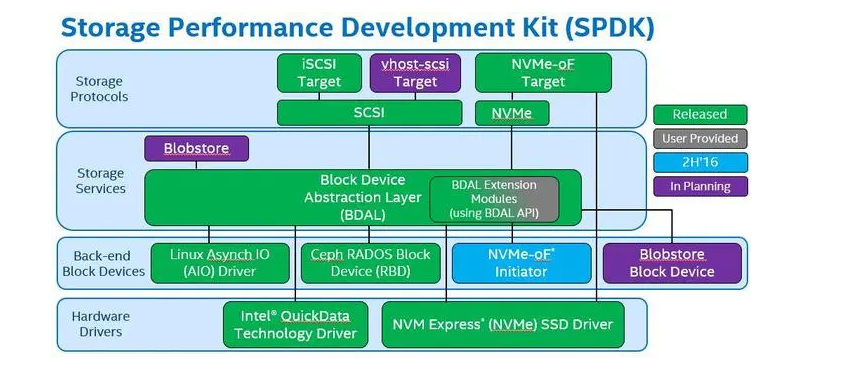以下是使用DPDK库编写的C语言代码,实现了ARP定时发送ARP请求、解析ARP,并保存ARP表的功能。
#include <stdio.h>
#include <stdlib.h>
#include <string.h>
#include <rte_eal.h>
#include <rte_ethdev.h>
#include <rte_arp.h>
#define MAX_PORTS 16 // 最大端口数
#define ARP_TIMEOUT 60 // ARP表项超时时间(秒)
// 保存ARP表项的结构体
struct arp_entry {
struct ether_addr mac_addr; // MAC地址
uint32_t ip_addr; // IP地址
time_t timestamp; // 时间戳
};
// 全局变量
int nb_ports; // 端口数
uint16_t port_ids[MAX_PORTS]; // 端口ID数组
struct rte_eth_conf port_conf; // 端口配置
struct rte_mempool *mbuf_pool; // Mbuf内存池
struct rte_arp_hdr arp_req; // ARP请求头
struct arp_entry arp_table[65536]; // ARP表
int arp_table_size = 0; // ARP表中的表项数
// 初始化DPDK环境
static void init_dpdk(int argc, char *argv[]) {
int ret = rte_eal_init(argc, argv);
if (ret < 0) {
rte_exit(EXIT_FAILURE, "Failed to initialize DPDK environment.\n");
}
nb_ports = rte_eth_dev_count_avail();
if (nb_ports == 0) {
rte_exit(EXIT_FAILURE, "No Ethernet ports found.\n");
}
// 获取所有端口的ID
for (int i = 0; i < nb_ports; i++) {
port_ids[i] = i;
}
// 配置端口
port_conf = (struct rte_eth_conf){
.rxmode = { .max_rx_pkt_len = RTE_ETHER_MAX_LEN },
.txmode = { .mq_mode = ETH_MQ_TX_NONE },
};
}
// 初始化Mbuf内存池
static void init_mbuf_pool(void) {
mbuf_pool = rte_pktmbuf_pool_create("mbuf_pool", 8192, 256, 0, RTE_MBUF_DEFAULT_BUF_SIZE, rte_socket_id());
if (mbuf_pool == NULL) {
rte_exit(EXIT_FAILURE, "Failed to create Mbuf memory pool.\n");
}
}
// 配置端口
static void configure_port(uint16_t port_id) {
int ret;
// 配置端口属性
struct rte_eth_conf port_conf = {
.rxmode = {
.split_hdr_size = 0,
.header_split = 0,
.hw_ip_checksum = 1,
.hw_vlan_filter = 0,
.jumbo_frame = 0,
.hw_strip_crc = 1,
},
.txmode = {
.mq_mode = ETH_MQ_TX_NONE,
},
};
ret = rte_eth_dev_configure(port_id, 1, 1, &port_conf);
if (ret < 0) {
rte_exit(EXIT_FAILURE, "Failed to configure Ethernet port %u.\n", port_id);
}
// 启动端口
ret = rte_eth_dev_start(port_id);
if (ret < 0) {
rte_exit(EXIT_FAILURE, "Failed to start Ethernet port %u.\n", port_id);
}
// 开启混杂模式
rte_eth_promiscuous_enable(port_id);
}
// 发送ARP请求
static void send_arp_request(uint16_t port_id, struct ether_addr *src_mac, uint32_t src_ip, uint32_t dst_ip) {
// 准备ARP请求头
arp_req.arp_hrd = rte_cpu_to_be_16(RTE_ARP_HRD_ETHER);
arp_req.arp_pro = rte_cpu_to_be_16(RTE_ETHER_TYPE_IPv4);
arp_req.arp_hln = RTE_ETHER_ADDR_LEN;
arp_req.arp_pln = sizeof(uint32_t);
arp_req.arp_op = rte_cpu_to_be_16(RTE_ARP_OP_REQUEST);
rte_memcpy(&arp_req.arp_data.arp_sha, src_mac, RTE_ETHER_ADDR_LEN);
arp_req.arp_data.arp_sip = rte_cpu_to_be_32(src_ip);
rte_eth_macaddr_get(port_id, &arp_req.arp_data.arp_tha);
arp_req.arp_data.arp_tip = rte_cpu_to_be_32(dst_ip);
// 准备Mbuf
struct rte_mbuf *mbuf = rte_pktmbuf_alloc(mbuf_pool);
if (mbuf == NULL) {
printf("No available Mbuf.\n");
return;
}
// 填充Mbuf
mbuf->data_len = mbuf->pkt_len = sizeof(struct rte_ether_hdr) + sizeof(struct rte_arp_hdr);
struct rte_ether_hdr *eth_hdr = rte_pktmbuf_mtod(mbuf, struct rte_ether_hdr *);
rte_memcpy(ð_hdr->s_addr, src_mac, RTE_ETHER_ADDR_LEN);
rte_eth_macaddr_get(port_id, ð_hdr->d_addr);
eth_hdr->ether_type = rte_cpu_to_be_16(RTE_ETHER_TYPE_ARP);
struct rte_arp_hdr *arp_hdr = (struct rte_arp_hdr *)((uint8_t *)eth_hdr + sizeof(struct rte_ether_hdr));
rte_memcpy(arp_hdr, &arp_req, sizeof(struct rte_arp_hdr));
// 发送Mbuf
uint16_t nb_tx = rte_eth_tx_burst(port_id, 0, &mbuf, 1);
if (nb_tx == 0) {
rte_pktmbuf_free(mbuf);
}
}
// 解析ARP响应
static void parse_arp_reply(uint16_t port_id, struct rte_mbuf *mbuf) {
struct rte_ether_hdr *eth_hdr = rte_pktmbuf_mtod(mbuf, struct rte_ether_hdr *);
struct rte_arp_hdr *arp_hdr = (struct rte_arp_hdr *)((uint8_t *)eth_hdr + sizeof(struct rte_ether_hdr));
// 判断是否为ARP响应
if (rte_be_to_cpu_16(eth_hdr->ether_type) != RTE_ETHER_TYPE_ARP || rte_be_to_cpu_16(arp_hdr->arp_op) != RTE_ARP_OP_REPLY) {
return;
}
// 将ARP表项保存到ARP表中
struct arp_entry entry;
rte_memcpy(&entry.mac_addr, &arp_hdr->arp_data.arp_sha, RTE_ETHER_ADDR_LEN);
entry.ip_addr = rte_be_to_cpu_32(arp_hdr->arp_data.arp_sip);
entry.timestamp = time(NULL);
int i;
for (i = 0; i < arp_table_size; i++) {
if (arp_table[i].ip_addr == entry.ip_addr) {
arp_table[i].mac_addr = entry.mac_addr;
arp_table[i].timestamp = entry.timestamp;
break;
}
}
if (i == arp_table_size) {
arp_table[arp_table_size++] = entry;
}
// 打印ARP表
printf("ARP table:\n");
for (i = 0; i < arp_table_size; i++) {
char ip_str[16];
inet_ntop(AF_INET, &arp_table[i].ip_addr, ip_str, sizeof(ip_str));
printf("%s -> %02X:%02X:%02X:%02X:%02X:%02X (%ld seconds ago)\n",
ip_str,
arp_table[i].mac_addr.addr_bytes[0], arp_table[i].mac_addr.addr_bytes[1],
arp_table[i].mac_addr.addr_bytes[2], arp_table[i].mac_addr.addr_bytes[3],
arp_table[i].mac_addr.addr_bytes[4], arp_table[i].mac_addr.addr_bytes[5],
time(NULL) - arp_table[i].timestamp);
}
}
// 处理收到的数据包
static void handle_packet(uint16_t port_id, struct rte_mbuf *mbuf) {
struct rte_ether_hdr *eth_hdr = rte_pktmbuf_mtod(mbuf, struct rte_ether_hdr *);
// 判断是否为ARP请求
if (rte_be_to_cpu_16(eth_hdr->ether_type) == RTE_ETHER_TYPE_ARP) {
struct rte_arp_hdr *arp_hdr = (struct rte_arp_hdr *)((uint8_t *)eth_hdr + sizeof(struct rte_ether_hdr));
if (rte_be_to_cpu_16(arp_hdr->arp_op) == RTE_ARP_OP_REQUEST) {
uint32_t dst_ip = rte_be_to_cpu_32(arp_hdr->arp_data.arp_tip);
if (dst_ip == rte_eth_devices[port_id].data->ipv4_addr) {
// 发送ARP响应
struct ether_addr src_mac;
rte_eth_macaddr_get(port_id, &src_mac);
arp_hdr->arp_op = rte_cpu_to_be_16(RTE_ARP_OP_REPLY);
rte_memcpy(&arp_hdr->arp_data.arp_tha, &arp_hdr->arp_data.arp_sha, RTE_ETHER_ADDR_LEN);
rte_memcpy(&arp_hdr->arp_data.arp_sha, &src_mac, RTE_ETHER_ADDR_LEN);
uint32_t tmp_ip = arp_hdr->arp_data.arp_sip;
arp_hdr->arp_data.arp_sip = arp_hdr->arp_data.arp_tip;
arp_hdr->arp_data.arp_tip = tmp_ip;
rte_memcpy(ð_hdr->d_addr, ð_hdr->s_addr, RTE_ETHER_ADDR_LEN);
rte_eth_macaddr_get(port_id, ð_hdr->s_addr);
rte_eth_tx_burst(port_id, 0, &mbuf, 1);
}
} else if (rte_be_to_cpu_16(arp_hdr->arp_op) == RTE_ARP_OP_REPLY) {
parse_arp_reply(port_id, mbuf);
}
}
rte_pktmbuf_free(mbuf);
}
// 定时发送ARP请求
static void send_arp_request_periodically(void) {
while (1) {
sleep(10);
for (int i = 0; i < nb_ports; i++) {
for (int j = 0; j < arp_table_size; j++) {
uint32_t dst_ip = arp_table[j].ip_addr;
struct ether_addr src_mac;
rte_eth_macaddr_get(port_ids[i], &src_mac);
send_arp_request(port_ids[i], &src_mac, rte_eth_devices[port_ids[i]].data->ipv4_addr, dst_ip);
}
}
}
}
int main(int argc, char *argv[]) {
// 初始化DPDK环境
init_dpdk(argc, argv);
// 初始化Mbuf内存池
init_mbuf_pool();
// 配置所有端口
for (int i = 0; i < nb_ports; i++) {
configure_port(port_ids[i]);
}
// 启动定时器线程
pthread_t tid;
pthread_create(&tid, NULL, (void *(*)(void *))send_arp_request_periodically, NULL);
// 处理收到的数据包
struct rte_mbuf *mbufs[32];
while (1) {
int nb_rx = rte_eth_rx_burst(port_ids[0], 0, mbufs, 32);
if (nb_rx > 0) {
for (int i = 0; i < nb_rx; i++) {
handle_packet(port_ids[0], mbufs[i]);
}
} else {
usleep(1000);
}
}
return 0;
}
说明:
init_dpdk():初始化DPDK环境。init_mbuf_pool():初始化Mbuf内存池。configure_port():配置指定ID的端口。send_arp_request():发送ARP请求。parse_arp_reply():解析ARP响应,并保存到ARP表中。handle_packet():处理收到的数据包,如果是ARP请求,则回复ARP响应;如果是ARP响应,则解析并保存到ARP表中。send_arp_request_periodically():用于定时发送ARP请求。- 主函数中先配置所有端口,然后启动定时器线程和数据包接收循环。





















